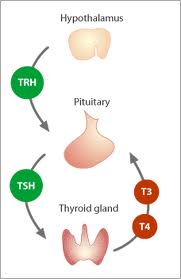In Population Near Uranium Plant, Headaches Predicted a Thyroid Problem
People with headache disorders may be at greater risk of developing hypothyroidism, a condition in which the thyroid does not produce enough thyroid hormone and various body processes start to slow down. A study by researcher Andrew Martin and colleagues in the Journal of Head and Face Pain is the largest to examine the likelihood that headache sufferers may be at risk for hypothyroidism.
About 2% of Americans develop hypothyroidism. The study by Martin and colleagues used data from a 20-year medical monitoring program for people who lived near a uranium processing plant in Ohio. The authors reported that people with pre-existing headache disorders had a 21% increased risk of new onset hypothyroidism during that period, while people who reported that they had migraines or regularly used headache medication had a 41% increased risk of hypothyroidism. People with migraines were most likely to develop hypothyroidism in the study. Female sex and age are additional risk factors for hypothyroidism. About 12% of the US population experiences migraines.
Thyroid Abnormalities Common in Childhood Mental Illness
 At the 57th Annual Meeting of the American Academy of Child and Adolescent Psychiatry (AACAP) in October 2010, Maria Gariup of Barcelona, Spain reported that thyroid abnormalities are common among children with major psychiatric diagnoses and, in particular, high levels of thyroid stimulating hormone (TSH) are common among those with bipolar illness.
At the 57th Annual Meeting of the American Academy of Child and Adolescent Psychiatry (AACAP) in October 2010, Maria Gariup of Barcelona, Spain reported that thyroid abnormalities are common among children with major psychiatric diagnoses and, in particular, high levels of thyroid stimulating hormone (TSH) are common among those with bipolar illness.
Editor’s Note: These findings may relate to reports of a greater incidence of anti-thyroid antibodies in adult patients with bipolar disorder compared with many other psychiatric groups.


